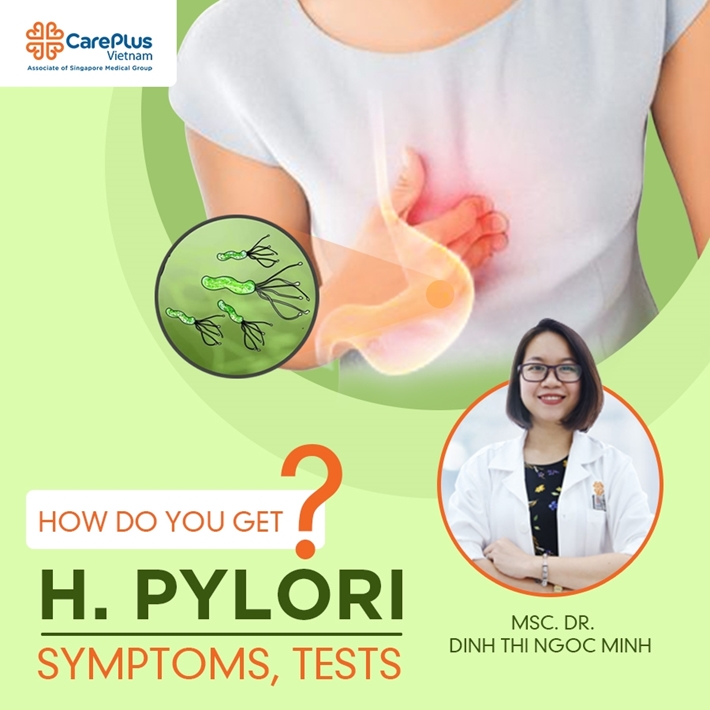How do you get H.pylori, Symptoms, Test
More than 50% of the world's population contains H. pylori in the gastrointestinal tract, especially this rate increases to more than 90% in developed countries. They cause peptic ulcers and the risk of stomach cancer.

6/16/2021 10:55:43 AM
More than 50% of the world's population contains H. pylori in the gastrointestinal tract, especially this rate increases to more than 90% in developed countries. They cause peptic ulcers and the risk of stomach cancer.
However, 80% of people infected with this bacteria are entirely asymptomatic. So how to detect whether the body is infected with HP or not? Let's learn about the issues surrounding HP bacteria through this article.
1. What are Helicobacter pylori?
Helicobacter pylori infection occurs when a patient infects the stomach with a bacterium called Helicobacter pylori. Most HP Infections do not cause any problems or symptoms. But in some individuals, Hp is the cause of unpleasant diseases such as:
Stomach and duodenal ulcers (duodenum is the first part of the small intestine)
Stomach cancer
These problems cause patients to have epigastric pain or bloating, indigestion, vomiting.
2. What are the symptoms of Hp infection?
About 70-80% of Hp infections are asymptomatic. But when A stomach ulcer causes cough, the following symptoms will appear:
- Pain or discomfort in the epigastrium
- Feeling bloated after eating only a small amount of food
- No feeling of hunger
- Nausea or vomiting
- Black stools
- Feeling tired
Although Hp causes not all stomach ulcers, you should see your doctor for examination and treatment if you find yourself with similar symptoms.
3. Who is at risk for HP infection?
All subjects are at risk of HP infection. Currently, it is estimated that about 50% of the world's population is infected with H. However, the incidence of the disease depends on many different factors such as age, geographical area, living habits, and quality of life.
Young children are also at high risk of infection because their parents or relatives infected with bacteria have the habit of kissing children's lips, offering food to children.
4. How can I check if my body is infected with HP?
Endoscopy to check for Hp
The most common way to find out if the stomach has H. pylori is through an endoscopy. The doctor will use a small tube to enter the stomach through the esophagus, then take a biopsy piece around the injury site of the stomach to do a chlorine test or bacterial culture. Thanks to this, the doctor can check the patient's Hp infection status. Endoscopy also helps the doctor to visualize best and evaluate the damage, if any, of the upper gastrointestinal tract.
Urea breath test
Besides endoscopy, the breath test is also a way to check for H. The patient will be given a breathing device and breathe into it. There are two types of breathing testing devices: the breathing test using a balloon (breathing into a device shaped like a balloon) and the breathing test using a card (blow into a device shaped like an ATM card).
Test HP through breath
This test measures the substance produced in the patient's breath (if any) in combination with a unique solution taken previously. The breath will be evaluated by a breathing test device and analyzed to see if it is positive for Hp.
A breath test, a comfortable test, gives accurate results, suitable for many subjects, especially children, sensitive to gastroscopy.
Stool test
Helicobacter pylori are present in the stomach and is excreted in the feces. Stool test by immunofluorescence will help detect Hp. Due to limitations and inconveniences, this test is rarely conducted.
Blood test for Hp
However, this is not the preferred type of test to perform. The reason is that Hp bacteria can hide in other areas such as the sinuses, intestines, and oral cavity and do not cause disease. Or it is also possible that the Hp bacteria in the stomach have been destroyed, and then the antibodies remain in the blood for a while, sometimes months, even years.
Therefore, if only based on blood tests to make conclusions, the results are not very reliable. Because the last two tests have limitations, most medical facilities often use endoscopic or breath tests more recently.
4. When should I take an HP test?
You should get tested for HP if you have the following symptoms:
- Have symptoms of peptic ulcer disease
- Had a stomach ulcer in the past
- Have stomach cancer
- If you need to take anti-inflammatory drugs or aspirin for a long time
Doctors sometimes also test Hp in patients with gastritis symptoms, but endoscopy results do not show ulcers.
5. How is HP treated?
HP can be completely cured with medicine. Most will take 3 or more medications for 2 weeks, including:
- Medicines to reduce the amount of acid secreted in the stomach – This medicine treats infections and heals ulcers
- Different types of antibiotics
Those who are assigned to test for Hp and give positive results should conduct treatment to:
- Helps heal ulcers
- Avoid recurrent ulcers
- Reduces the risk of ulcers getting worse or progressing to cancer
- Treatment should follow your doctor's instructions and tell your doctor right away if you have any side effects.
Continuous monitoring after treatment
After treatment, the patient should return to check if he has successfully eradicated Hp. Now you can do the following tests to check:
- Breath test
- Stool test
- Endoscopic
Most of over 80% HP will be successfully eradicated. However, a few cases of Hp do not respond to the first regimen treatment. Maybe doctors will consider adding drugs to the patient.
When the test results are positive, the patient needs to coordinate with the doctor to get a proper treatment for H. Adhering to the treatment regimen of Hp with many combination drugs, using the correct dose and prescribed time helps to treat Hp effectively.